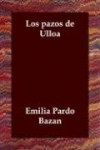Lagraziana's Kalliopeion
This is a blog about my reads as well as everything related to them.
My taste is for good quality literature - old and new. Some of it I review here or on my main book blog Edith's Miscellany.
A Woman’s Misery in a Male World: The House of Ulloa by Emilia Pardo Bazán
As I already remarked two years ago, when I wrote a biography of Emilia Pardo Bazán (1851-1921) on my main book blog Edith’s Miscellany (»»» read her author’s portrait there), the important Spanish author unlike her male counterparts from English-speaking countries and France began to fall into oblivion rather soon after she gained considerable fame for her work. Several of her books have been translated into English. Two of them are her most famous novel The House of Ulloa from 1886, which has been reissued in English translation only in 2013, and its often overlooked sequel Mother Nature from 1887. As an example of Spanish Naturalist writing above all the first deserves a closer look.
The House of Ulloa is set towards the end of the reign of Spanish Queen Isabel II, more precisely just before the liberal revolution of 1868. Father Julián Alvarez enters into service with Don Pedro Moscoso who has a remote country estate in Galicia and is generally known as marquis of Ulloa although in reality the title belongs to a cousin living in Santiago. The young priest is supposed to take care of the marquis’ affairs sorting papers in the library that are in a complete mess, but to his great dismay he finds that his private life is in disorder too and the estate threatened by ruin. In fact, his employer turns out to be a man of loose morals who openly consorts with his mistress Sabel working in the kitchen and treats his illegitimate four-year-old no better than his hounds. Moreover, his daily life is filled with little more than hunting and drinking. When pious and naïve Father Julián asks Don Pedro to change his ways, he admits that he can’t because his steward Primitivo, the father of Sabel, would never allow it and has the power to turn all peasants of the region against him. Nonetheless, the priest hopes to lead his employer back on the path of virtue and suggests that he passes some time in Santiago to choose a wife from his Cousin Manuel’s daughters. Thus he marries Marcelina, called Nucha, and brings her to the house of Ulloa as his wife and new mistress of the estate, but the discreet young woman soon realises that she isn’t accepted and that her husband goes on with his life as if she weren’t there. She suffers and makes Father Julián her confidant. The priest, though, is powerless and can only watch what is going on. Meanwhile, Don Pedro gets involved into politics which at the time is inseparably linked with corruption and risks his estate…
In this naturalist masterpiece the nineteenth-century author Emilia Pardo Bazán skilfully interweaves the main story of predominantly male decadence and corruption in politics as well as society with a feminist critique of a patriarchal world that submits women of all classes to a sexual double standard, violence and abuse in the name of Catholic religion and often with the help of clerics. Although the novel touches very serious topics and has a not less serious plot, its tone is not only gloomy like the wintry landscape of Galicia but also full of wit and clever irony. Moreover, it’s a timeless work of literature that has lost none of its power and meaning in this modern world. In other words, The House of Ulloa is one of those almost forgotten classics that deserve being read more widely outside its country of origin Spain.
Nota bene:
The original Spanish versions of Emilia Pardo Bazán’s work have long entered into the public domain and many of them as well as some older translations are available for free via the Virtual Library Miguel de Cervantes, on Feedbooks, on Project Gutenberg, on Wikisource, and several other sites of the kind.










